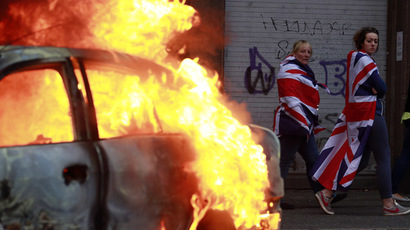Ian Paisley, ex-N. Ireland first minister and controversial Unionist, dead at 88

Dr Ian Paisley, a controversial preacher and staunchly anti-Republican politician who became Northern Ireland’s First Minister, died on Friday morning aged 88.
Renowned for hardline Unionism through much of his career, the former Democratic Unionist Party leader was recognized as a vital force in forging Northern Ireland’s peace process in later years.
His death was announced by his wife, Eileen, early on Friday.
Paisley, who became Lord Bannside following his entry into the House of Lords in 2010, was leader of the Democratic Unionist Party from 1971 until 2008. He served as Northern Ireland’s First Minister alongside his rival and deputy Martin McGuinness from 2007 to 2008, and was also elected as a Westminster MP for North Antrim for four decades.
Previously a vehement critic of power-sharing with his fellow Republicans, his reluctance to compromise in this context during the Troubles was typified by his “No Surrender” slogan. However, Paisley’s hardened unionist stance softened over time, and he eventually shared office with McGuinness in August 2007.

Paisley was a vehement critic of the 1998 Good Friday Agreement, which paved the way for the formation of the first power-sharing administration Stormont had seen since 1974.
But following his signing of the St Andrews Agreement in 2006, Paisley underwent a considerable political transformation, which culminated in his going into government with Sinn Fein a year later.
A vocal critic of the Catholic Church, Paisley was once ordered to leave European Parliament buildings in 1988 for denouncing Pope John Paul II as the “anti-Christ.”
In a formal statement, Mrs Paisley said her “beloved husband, Ian, entered his eternal rest this morning.”
“Although ours is the grand hope of reunion, naturally as a family we are heartbroken. We loved him and he adored us, and our earthly lives are forever changed," she added.
Paisley’s funeral will be held privately, but a public service to commemorate his life will take place later this year.














